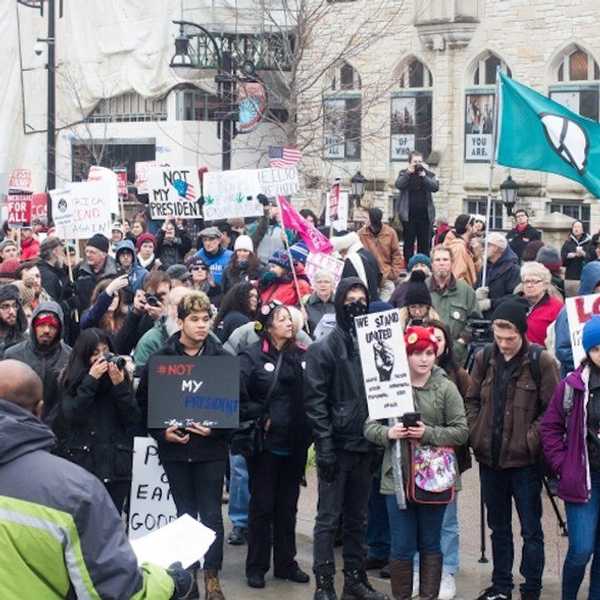In the wake of tragedies like the Parkland shooting, gun control is on everyone’s mind. Some people say no private citizen needs heavy duty firepower and support the kind of gun control measures that exist in places like Australia. Some say the right to bear arms is a crucial freedom written in the American Constitution itself. But civilian gun control is just one kind of gun control. Few people ever ask what kind of weapons our police should have.
To make a divisive issue even more divisive, here are 3 reasons why we need gun control for law enforcement.
1. Police are safer than ever, it’s civilians who are getting killed
Despite what you may have heard about the dangers cops face, 2015, 2016, and 2017 were some of the safest years ever recorded for cops. According to the National Law Enforcement Memorial Fund, in 2017, there were 128 law enforcement fatalities. In that same year, Mapping Police Violence reported that 1,129 people were killed by police officers. Over 25% were black. To make matters worse, President Trump has restored a program which sends the military surplus to police departments across America. Police will now have the same weapons and equipment our military uses against enemies of the state.
2. The police don’t need guns since they have no obligation to protect anyone
It’s not a conspiracy theory, a 1989 Supreme Court case, DeShaney v. Winnebago County, says just that. It began with a 1980 divorce court ruling which gave Randy DeShaney full custody of his son. The boy was hospitalized for the first time in January 1983. This and several reported instances of child abuse prompted a visit from the Department of Social Services. They attempted to prevent the boy from returning to his father’s care but the court dismissed the case. The DSS followed and entered into five different agreements with Randy from 1983 to 1984. Despite suspicions of child abuse and several confirmed accounts of Randy violated the agreements between him and the DSS, the police refused to take action and in March 1984 the boy, now 4-years-old, was hospitalized again. This time he had fallen into a life-threatening coma. He would have to live the rest of his life confined to an institution and died in 2015, at age 36, due resulting brain trauma. His mother sued the county for failing to act in 1984, taking the case all the way to the Supreme Court. The court ruled 6-3 that no state institution had a “constitutional duty” to protect the boy.
This ruling was reaffirmed in the 2005 Supreme Court case Town of Castle Rock v. Gonzales. Jessica Lenahan-Gonzales, a resident of Castle Rock, Colorado, obtained a permanent restraining order against her abusive ex-husband Simon Gonzales in 1999, requiring him to stay 100 yards from her and her four children (except during a specified visitation time). On June 22, 1999, Simon violated the restraining order when he kidnapped his biological children, three daughters, from Jessica’s home. Jessica contacted the police several times, once giving them the exact location of an amusement park Simon said he had taken them to. The police refused to act, claiming that Jessica had allowed Simon to see the children outside of visitation hours before. On June 23, Simon showed up at the Castle Rock Police Station in a truck and was shot and killed in a firefight between him and the police. A search of his truck uncovered the corpses of three little girls. Jessica sued the town, taking the case all the way to the Supreme Court. The court ruled 7-2 that the Castle Rock Police Department had no obligation to act.
These decisions have not gone unnoticed. In 2011, Town of Castle Rock v. Gonzales was taken before the Inter-American Commission on Human Right. The Commission, of which the United States is a part of, stated, “the failure of the United States to adequately organize its state structure to protect (the Gonzales girls) from domestic violence was discriminatory and constituted a violation of their right to life.” But this has done nothing to change any important minds in the US.
The rulings are clear – the police do not have an obligation to protect. And this isn’t just a one-time-only thing. Broward County Sheriff's Deputy Scot Peterson cowered outside of the Parkland school as people were killed at random inside. "Serve and protect", legally, is nothing more than a slogan. If the police aren't protecting anyone then what do they need guns for? We need to demand more of our police and demand that law enforcement agents face consequences for their actions and inactions. If they can’t be trusted to keep people safe then they have no business running around with deadly weapons.
3. There are other ways
Police disarmament is not an idealist fantasy. In many places in the world it’s a reality. In Ireland, less than a quarter of police officers are even trained to use firearms. The Irish Garda Síochána (Guardians of the Peace) are almost entirely disarmed. Their power comes not from force and fear but from the consent of the people and their moral authority as protectors. The same goes for the United Kingdom. In the UK, 82% of officers polled said they don’t want to be armed. Greater Manchester Chief Constable Sir Peter Fahy was quoted in 2012, saying: "sadly we know from the experience in America and other countries that having armed officers certainly does not mean, sadly, that police officers do not end up getting shot.” Even in Iceland, where a third of the population is armed, most police officers are not. The first time a police officer ever shot someone in Iceland was 2013.
There are other ways. We do not need our police to be outfitted like death squads to enjoy peace, law, and order. Next time gun control comes up, keep police gun control in mind. It’s just as important.



















